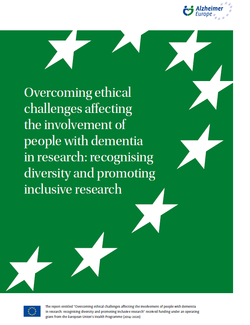
Discussion paper highlights need for involvement of a more diverse set of people in dementia research
Brussels, 18 February 2020 – Alzheimer Europe (AE) has launched its new publication: “Overcoming ethical challenges affecting the involvement of people with dementia in research: recognising diversity and promoting inclusive research.”

The ethics working group set out in 2019 to explore different ethical challenges affecting the involvement of people with dementia in research. Ethically sound involvement in research is about how people with dementia are treated but also about who sets the research agenda, who is involved, at what stage and in what capacity. People with dementia should be involved in research not only as participants but also in the context of Public Involvement. A comprehensive review of the literature and rigorous debate led to the publication of a discussion paper and recommendations which are targeted at researchers, members of ethics research committees and funders of research. Valuable input was also provided by the European Working Group of People with Dementia and several independent experts.
People with dementia form a diverse heterogeneous group made up of people with multiple/intersecting identities and characteristics. There are, for example, people with dementia from different ethnic groups, of different ages and gender identities, and with different disabilities, levels of education and socio-economic backgrounds. People from minority and marginalised groups continue to be underrepresented in research, resulting in their experience, perspectives and needs being ignored.
Multiple characteristics and factors need to be considered when trying to attract a diverse set of people to research. However, it is important to avoid locating ‘the problem’ in the individual, as this detracts attention from the way that structures, organisations, procedures and systems create problems and lead to discrimination and marginalisation. The tendency for researchers to consider some people with dementia as ‘hard to reach’ may result in them overlooking their own responsibilities with regard to the promotion of diversity and inclusive research. At the same time, the requirements and methods needed for inclusive research must correspond to those required for good quality and hence ethical research. Failure to find the right balance would result in unsound research which needlessly exposes people to risk, inconvenience and burden.
It is hoped that this discussion paper will promote useful and constructive debate and encourage the ethically sound involvement of a more diverse set of people with dementia in all aspects of research.
Alzheimer Europe would like to thank the members of the ethics working group, namely Dianne Gove (Chair), Jean Georges, Mohammed Akhlak Rauf, Ann Claeys, Corinna Porteri, Ingrid Hellström, Jennifer van den Broeke, Karen Watchman, Karin Jongsmaa, Krista Tromp and Saloua Berdai Chaouni.
The discussion paper can be purchased or a copy freely downloaded from the Alzheimer Europe website: http://alzheimer-europe.org/Publications